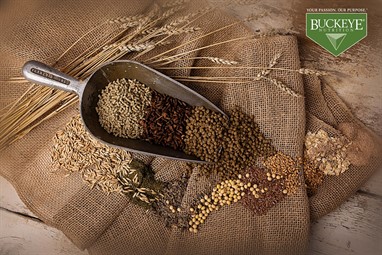
Protein is important for more than just muscle building. Protein is a component of most tissues in the body, and is essential for cell structure, the immune system, transport of oxygen and minerals in the blood, enzyme activity and many other biological functions.
What is protein?
All protein is made up of amino acids. Amino acids are like the letters of an alphabet that make up the words that are proteins. Essential amino acids must be consumed in the diet because they cannot be made by the body. Examples of essential amino acids are lysine, methionine and threonine. These amino acids are contained in protein sources such as fresh forage, soybeans and alfalfa.
Protein Myths Busted
Excess dietary protein does not cause horses to be hot tempered, have excess energy or contribute to growth abnormalities (developmental orthopedic disease, or DOD) in young animals. The main causes of DOD include genetics, high calorie intake and mineral imbalances. If DOD is suspected, a veterinarian and nutritionist should be consulted promptly. In addition, high protein diets do not cause damage to kidneys or the liver.
Dietary protein
Healthy, mature horses require about 10% of the total diet as good quality protein. Horses in heavy exercise, such as race horses or high level eventers, may require a little more protein in the diet. Young, growing horses, pregnant and lactating mares have much higher protein requirements compared to the average adult.
Protein in Feed
One pound of BUCKEYE® Nutrition’s ration balancer, GRO ‘N WIN™, contains 32% crude protein, and provides 145 grams of protein, about 23% of an 1,100 pound horse’s daily maintenance need.
Five pounds of a grain concentrate with 12% crude protein, such as EQ8™ Gut Health, provides 272 grams crude protein, or about 35% of a moderately exercising horse’s daily need. The balance of protein should be provided by good quality forage.
Excess Protein
Excess dietary protein is broken down and excreted in the urine. Nitrogen is a component of all amino acids in protein, therefore consuming excess dietary protein will cause increased excretion of nitrogen. Excreted nitrogen can then be converted to ammonia by bacteria in the process of decomposition. If nitrogen from horse waste (or other sources, for that matter) runs off into surface water, the potential for eutrophication of waterways increases. Horses with kidney disease or liver dysfunction should be placed on a low-protein diet. It is still important to provide quality protein for these compromised horses without excess, which can strain already struggling organs.
Insufficient Protein
Inadequate dietary protein will stunt growth, cause weight loss, fetal loss in pregnant mares, decreased milk production in lactating mares, and loss of muscle mass. These will occur despite adequate intake of calories.
Summary
Good quality hay contains healthy protein to support the overall health of the horse. Protein is not harmful when consumed in excess and does not cause excitability. A balanced diet that provides protein with essential amino acids is the baseline for a healthy horse.
Sources:
- The Ecosystems Center, Primer on Nitrogen. Online at: http://ecosystems.mbl.edu/Research/Clue/nitrogen.html
- National Research Council. 2007. Nutrient Requirements of Horses, 6th Revised Edition. National Academies Press, Washington, DC.
- Westendorf, M. 2004. Horses and manure. Rutgers Cooperative Extension Fact Sheet #036. http://esc.rutgers.edu/fact_sheet/horses-and-manure/